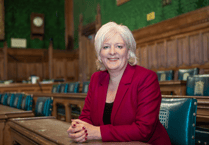The election debates have revealed contrasting approaches to achieving net zero. Net zero is when the carbon emissions we are adding to the atmosphere equal those being taken out, so that temperatures stop rising.
The technologies we already have can get us most of the way to net zero. And the science is clear, every incremental step on the way to net zero will reduce temperatures. But how fast can we go and at what cost?
Sir Patrick Vallance was the government’s Chief Scientist during the Covid pandemic, and argues that in the race to net zero, we need to make a vaccine-style effort, beginning with decarbonising Britain’s electricity supplies by 2030. He proposes a concerted effort across government, industry and academia, where the UK still leads in sciences and engineering.
By investing in skills and industries, we can take advantage of the one-off opportunity of the energy transformation by developing new clean technologies and exporting them around the world, reaping the economic benefits. But if we fail to invest, we will have to import solutions from other countries with more money leaving the economy.
“Moving swiftly towards a clean power system is an investment, not just a cost,” Sir Patrick says, “Achieving energy self-sufficiency will protect us from the volatility of the international fossil fuel market. It’s about our security, cost of living, job opportunities, and climate”.
We also need to consider the costs of not quickly getting to net zero. Disrupted weather patterns will impact food production leading to higher food prices, and we will have to face ever-increasing costs of adapting to rising sea levels and rapid climate change.
Most of the funding for net zero will come from the private sector, but Government can invest public money in research and in stimulating these new industrial capabilities. However, companies will only invest if they know there will be a market for their clean technologies, so it is critical that government sets out a firm timetable for moving to clean energy with binding
legislation on phasing out fossil fuels. Patrick Vallance cautions against delaying net zero policies, “If we choose to go slowly, others will provide the answers, and we will ultimately end up buying the solutions.”
To meet the challenge, we need political leaders who are not in thrall to vested interests in the oil and gas sector and who do not parrot the scare stories pumped out by the fossil fuel lobby. This thinking will keep us stuck in the old carbon intensive ways of doing things, and our economy will fall behind. The High Court has twice ruled that the UK government’s climate strategy is not fit-for-purpose.
Trying to resist net zero is postponing the inevitable and means we’ll miss out on lower energy bills, skilled jobs and energy independence.
Election candidates should tell us how they propose to invest in net zero.





Comments
This article has no comments yet. Be the first to leave a comment.